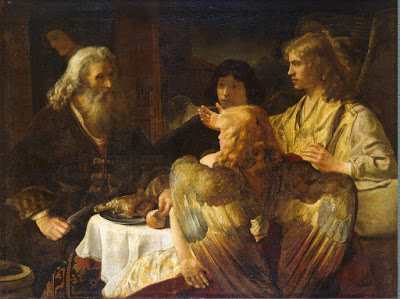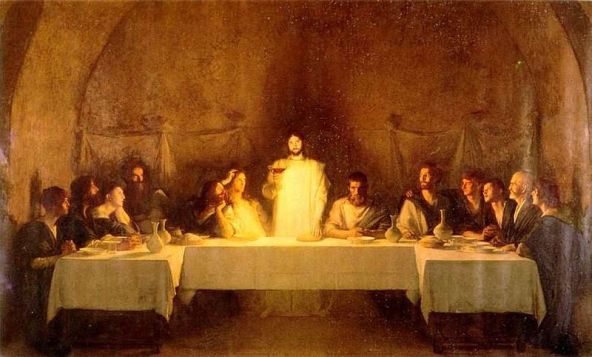Posted on April 29, 2016

Most of the time I feel just like the Israelites of old who doubted God would provide. I have just as many stories as they did to prove he has and will, but this time...this time is different?
At our Easter Festival this year in which our church dramatizes seven Scripture passages, the Creation passage concluded with a table being set for Adam and Eve in the garden, a place to have a meal with God. During the Fall, the table crashed to the ground. Later, in the Zephaniah reading in which God gathers his people and restores to them what was lost, the Eucharistic table was brought out and set in invitation to all those who are in God's family--redeemed from the Fall, restored to fellowship.
I have been reflecting on this table all Lent when I was part of the preparations for the Festival. A table set for a meal represents fellowship, good food prepared in anticipation, nourishment, good conversation, laughter, community, the unfolding of one's soul, belonging, family. And then I have troubled over the table that is visited with loss, broken relationships, silence, deprivation of community and nourishment, and how often there simply is no coming together at a table when those conditions prevail. People grab food on their own, sit in silence, have no anticipation of an event at the table, have no special food prepared in love. (I always think of Napoleon Dynamite making a steak in the microwave).
Since the Fall and the broken fellowship with God that could have been ours, that daily feasting in conversation and discovery with the God of the universe--God has not left us without food to despair of what we lost. Instead, he invites us over and over to the meal he prepares for us until the day when we will sit down to the banquet feast he is preparing even now for us in eternity.
The Bible is replete with meals eaten in communion with God and others as we journey toward the ultimate restoration. Whenever the Angel of the Lord appeared to someone in the Old Testament, those being visited would rush to prepare a meal (a little different than the "rushed" meal we would prepare, as they had to kill an animal, make fresh bread, etc.) All that time over preparation and sharing of a meal was considered necessary and important to the coming together of God and man. The famous representations of God visiting Abraham and sitting at the table with him have always blessed me. It was at this table that God revealed to Abraham his plan to give him a son, a whole horizon of descendants.

God continues to call us to his table, and he continues to provide a table for us in every circumstance if we will only sit down and partake. The Psalms say that God prepares a table for us, even in the presence of our enemies. He leads us to streams to drink, to green fields to feed. Elijah was awakened by angels three times and given food from heaven to strengthen him for an exhausting journey. Jesus multiplied food miraculously to feed thousands more than once. He was often at table with sinners, with his disciples, with his friends. It was at that Last Supper that he promised himself as food. Then there is the breakfast on the beach with Jesus after his resurrection.
God chooses a tangible way that we meet him--over food, in community.
This Eucharistic table established for us is such a tangible expression of God's presence with us--real bread in real time. This is eternal bread that feeds us on all levels of need. It is the Great Thanksgiving (as it is called in the liturgy) because we are thanking God that he meets us at the table; the intersection of heaven and earth, God with his people happens now.
It is in the meal that we meet Jesus.
And yet...we struggle with the same, age-old unbelief of the Israelites. Even though God has fed us time and time again, we doubt he will do so in our current circumstances. Psalm 78 catalogs God's wondrous works on behalf of his people from splitting open the sea so they could pass through to leading them by a cloud and a glow of fire, splitting hard rocks to give them drink from the great deep.
But in spite of the constant manifestation of God's provision, they "railed against God and said, 'Can God set a table in the wilderness? True, he struck the rock, the waters gushed out, and the gullies overflowed; but is he able to give bread or to provide meat for his people?'"
God is angered by this, "For they had no faith in God, nor did they put their trust in his saving power." But he still rains down manna and gives them grain from heaven. He causes the east wind to blow in quail so they are well filled. And then this glorious verse:
"Man ate of the bread of the angels; he sent them food in abundance."
We wander in the wilderness of our lives, complaining, wondering if we will stumble on food, or we scrabble around trying to figure out how to get it from stone. God wants us to expect food, to believe he will provide. He wants us to come to him anticipating the provision he will unfold for us, to ask, to expect him to strike even a stone and have it yield its goods.
A friend once told me about her niece who was not allowed to attend church because her parents were against it, even though this young girl craved connection with Jesus. This niece loved to talk and pray with her aunt. One day they were saying the Lord's Prayer together, and as they came to the line, "Give us this day our daily bread...," the young girl said, "This is when you open your mouth, and he puts bread in it." My friend questioned her niece, and the girl assumed this happened for everyone--"Yes, I open my mouth at that point, and he always puts bread in it." "Real bread?" my friend asked suspiciously. "Of course. Then you chew it up."
Evidently, for a long time this dear girl had been sharing time with the Lord in which he miraculously put real bread in her mouth--a special manifestation to her of his real presence with her. Why did I have trouble believing that God did that for that little girl when God made two fish and five loaves feed multitudes, when he rained down bread from heaven, and when he caused ravens to carry food to his prophet?
How many meals have we missed because we simply don't believe God will meet us? As we journey through this life, we should be expecting to stumble on God's provision everywhere. We should long for it and wait for it. Over and over in my life when I have come to God's Word or to Church or to prayer or to his people with expectation and need, he has fed me. Maybe it was a food I didn't recognize at first, like the Israelites who saw the manna and said, "What is it?" But as I trusted and ate, it was always enough.
"Behold, I stand at the door and knock. If anyone hears my voice and opens the door, I will come in to him and eat with him, and he with me." (Rev. 3:20) Far from withholding from us, God loves to share a meal with us. God's food, his table is set for us.
"Open wide your mouth, and I will fill it."
May your eyes be opened to see the table set for you in the wilderness.






